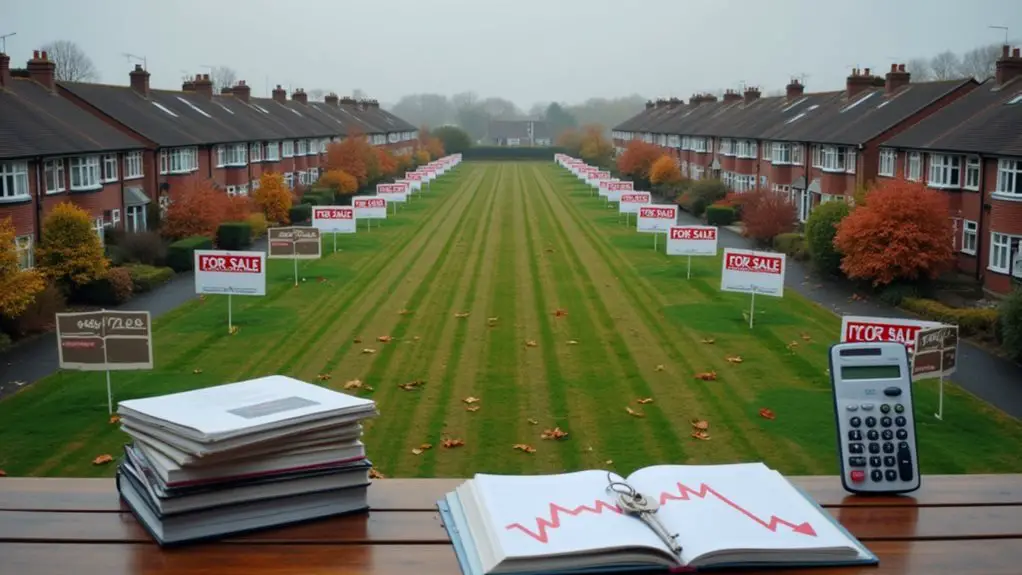Investors rushed to sell properties in 2024/25 due to shifting market conditions after holding back previously. Selling activity reached 10.8% of all homes sold nationwide, with approximately 509,000 investor-sold properties. This trend reflected a response to softening rental markets, increased housing inventory (up 15.9% year-over-year), and narrowing profit margins. Small investors sold 270,000 homes while large investors dramatically reduced net acquisitions from 134,000 in 2021 to just 8,700. These market shifts signal important changes in real estate investment strategies.

As the real estate market continues to evolve in 2024, investor selling activity has reached an unprecedented level of 10.8% of all homes sold nationwide. This marks a notable shift from previous years when investors held onto properties during favorable market conditions.
You’re witnessing a dramatic change in investor behavior compared to 2023. Approximately 509,000 homes were sold by investors in 2024, which exceeds pre-pandemic levels despite falling short of peak pandemic years. This 5.2% year-over-year increase in investor sales outpaced the modest rise in investor buying activity.
Small investors led this selling trend with 270,000 homes sold in 2024, making it the third-highest on record. Large investors weren’t far behind, selling 123,800 homes—an increase from 2023 but still below pandemic peaks. States like Oklahoma and Missouri topped the list with investor seller shares of 16.7% each, indicating regional hotspots for this selling activity.
The margin between investor purchases and sales has narrowed dramatically. Large investors’ net buying shrank to only 8,700 more homes bought than sold in 2024, down from 134,000 in 2021. Medium investors bought barely more homes than they sold, with a net increase of less than 250 properties.
What’s driving this shift? Unlike the post-pandemic era when investors sold to capitalize on soaring home values, current sales reflect a softening market. Easing rents have reduced incentives to maintain large property portfolios, prompting many investors to sell.
The housing market showed clear signs of cooling by mid-2025. Total inventory increased 15.9% year-over-year, with new home inventory reaching levels not seen since 2007-2008. Despite this growing supply, demand remained low.
Financing costs became a critical factor in investor decisions. High mortgage rates persisted through 2024, limiting buyer demand. Cash sales rose to 29% of transactions by mid-2025, indicating investors’ preference for liquidity. The significant rise in cash transactions reflects a continuing trend observed in NAR data, which showed cash sales increasing from 27% in May to 29% in June.
The rental market, which initially supported buy-and-hold strategies, began showing early signs of cooling. While rents remained 29.4% above pre-pandemic levels, their growth slowed, diminishing the appeal of maintaining investment properties and pushing more investors toward selling.
Frequently Asked Questions
How Do New Tax Policies Influence Investor Selling Decisions?
You’re facing several tax policy changes that influence your property selling decisions.
The top tax rate will increase from 37% to 39.6% in 2026, reducing your after-tax profits.
Estate taxes could apply retroactively at rates up to 40% after 2025.
Mortgage interest deduction limits will remain at $750,000 instead of increasing to $1 million.
Additionally, property tax reforms are shifting higher burdens to investor-owned properties, increasing your holding costs.
What Market Indicators Signal the Best Time to Sell?
You should watch for several key market indicators before selling.
Monitor inventory levels, as rising supply often signals a shift toward buyer advantage.
Track price appreciation rates, which suggest ideal selling when they’re positive but slowing.
Pay attention to interest rate trends, as lower rates typically boost buyer demand.
Also, consider economic factors like employment growth and regional development plans.
Local market conditions ultimately matter most, so evaluate your specific area’s metrics rather than just national trends.
Are Property Values Expected to Rebound After 2025?
Yes, property values are expected to rebound after 2025, but with moderate growth rather than dramatic increases.
You’ll likely see annual appreciation of 3-5% between 2025-2030, according to multiple forecasts.
Most experts project a stable recovery, not a boom. The NAR anticipates a 2% increase for 2026, while total appreciation could reach 17% by 2029 if economic conditions remain favorable.
Regional variations will occur, with some markets potentially exceeding 5% growth while others remain below 3%.
How Has Remote Work Affected Investment Property Demand?
Remote work has greatly shifted your investment property opportunities.
You’ll find stronger demand in suburban and rural areas, where buyers seek larger homes with dedicated office spaces.
Your investments in secondary cities like Boise and Austin may yield better returns as remote workers relocate there for affordability and quality of life.
Properties with high-speed internet and quiet workspaces command premium prices, while traditional urban apartments and office spaces face declining demand as companies downsize their physical footprints.
Which Cities Experienced the Highest Rates of Investor Sales?
Jacksonville, NC topped investor sales with a 2.46% listing rate in Q2 2025, driven by military presence and coastal growth.
You’ll also find high investor sales in Reno, Orlando, and Dallas-Fort Worth, where population growth and job opportunities attracted sellers.
Secondary markets like Grand Junction, Fort Collins, Tampa, St. Petersburg, and Cleveland showed notable increases.
Boise remained strong with homes selling in just 27 days, reflecting continued demand from remote workers relocating to these areas.
- Why Investors Rushed to Sell Properties in 2024/25 After Holding Back in 2023/24 - July 25, 2025
- Why Buy-to-Let Lending Is Booming Despite Market Turmoil and Surprising Investor Shifts - July 25, 2025
- Why Mega Investments Are Flocking to the North East: A Transformational Business Surge - July 25, 2025


